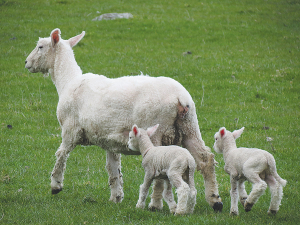Cows down
OPINION: It's not happening as fast as the greenies would like - they actually want all livestock other than Muscovy ducks and Tibetan Llamas to disappear entirely - but it is happening.
 The breeding ewe flock continues to decline with a 0.9% reduction following a 5.2% reduction in 2022.
The breeding ewe flock continues to decline with a 0.9% reduction following a 5.2% reduction in 2022.
A new study from Beef + Lamb NZ (B+LNZ) shows that land-use change is continuing to have an impact on livestock numbers.
The B+LNZ Stock Number Survey, which provides an assessment of New Zealand’s sheep flock and beef cattle herd, shows the breeding ewe flock continues to decline with a 0.9% reduction following a 5.2% reduction in 2022.
B+LNZ chief insight officer Julian Ashby says the breeding flock is the key indicator of future flock size.
“It’s trending down and is expected to continue to decline, one of the contributing factors is land-use change,” says Ashby.
“The amount of sheep and beef farmland being converted to forestry, along with the cumulative impact of a range of other policies on farm viability, is concerning.”
An updated analysis of land-use change from pastoral farming to large-scale forestry released by B+LNZ in July shows more than 200,000ha of sheep and beef farms had been sold into forestry in the last five years.
Ashby says this is now being reflected in livestock numbers.
“We have been saying for some time that there needs to be specific limits on the amount of forestry that can be used to offset fossil fuel emissions in the ETS,” he says.
“B+LNZ is not anti-forestry, we know many farmers are interested in integrating trees into their farms, but there must be some balance.”
On a more positive note, the forecast for lambing is expected to slightly increase this spring.
B+LNZ Economic Service chief economist Andrew Burtt says this is good news for both farmers and exporters and follows favourable Autumn conditions for ewes at mating.
Meanwhile, the total number of beef cattle at 30 June 2023, estimated at 3.81 million, is down 2.4%.
“The number of breeding cows and heifers increased 1.1 percent, with the South Island, mostly, leading the increase. Breeding cow numbers lifted as farmers chose to reduce weaner and trading cattle numbers,” says Burtt.
“The number of beef cattle weaners decreased 3.2 percent overall, but Southland farms bucked the trend and replenished weaner numbers by over 20 percent following two years of dry conditions.”
An independent report, prepared for Alliance farmer shareholders is backing the proposed $250 million joint venture investment by Irish company Dawn Meats Group.
Whangarei field service technician, Bryce Dickson has cemented his place in John Deere’s history, becoming the first ever person to win an award for the third time at the annual Australian and New Zealand Technician of the Year Awards, announced at a gala dinner in Brisbane last night.
NZPork has appointed Auckland-based Paul Bucknell as its new chair.
The Government claims to have delivered on its election promise to protect productive farmland from emissions trading scheme (ETS) but red meat farmers aren’t happy.
Foot and Mouth Disease outbreaks could have a detrimental impact on any country's rural sector, as seen in the United Kingdom's 2000 outbreak that saw the compulsory slaughter of over six million animals.
The Ministry for the Environment is joining as a national award sponsor in the Ballance Farm Environment Awards (BFEA from next year).

OPINION: For years, the ironically named Dr Mike Joy has used his position at Victoria University to wage an activist-style…
OPINION: A mate of yours truly has had an absolute gutsful of the activist group SAFE.